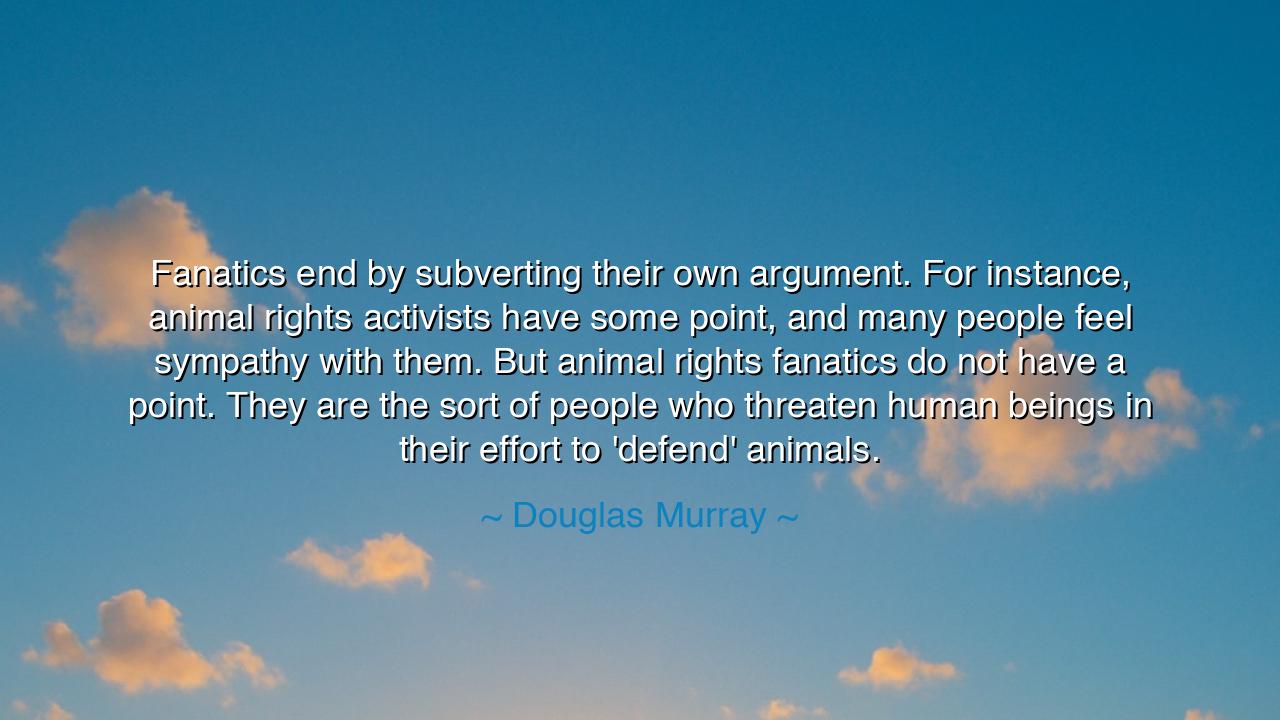
Fanatics end by subverting their own argument. For instance
Fanatics end by subverting their own argument. For instance, animal rights activists have some point, and many people feel sympathy with them. But animal rights fanatics do not have a point. They are the sort of people who threaten human beings in their effort to 'defend' animals.






Hear now, O future generations, a truth that has echoed through the ages: in the fervor of passion, there lies a danger—one that can turn the most noble of causes into a weapon of destruction. The words of the wise Douglas Murray resound like a warning bell: "Fanatics end by subverting their own argument. For instance, animal rights activists have some point, and many people feel sympathy with them. But animal rights fanatics do not have a point. They are the sort of people who threaten human beings in their effort to 'defend' animals." These words, though sharp, reveal a deep lesson about the nature of zeal, fervor, and the dangers of carrying a cause to extremes.
Consider, O children of the future, the great forces that drive men to action—those passions that burn bright within the human soul. Zeal can be a powerful force, one that lifts a person to heights of greatness, but it is also a double-edged sword. In the heat of passion, the true purpose of a cause can be obscured, for the fanatic, in their obsession, often forgets the very principles they once sought to uphold. Fanaticism, that extreme devotion to a cause, leads not to clarity, but to destruction. It twists the very argument it seeks to support, for in the fervor of action, it forgets that the end does not justify the means.
Let us reflect upon the ancient world, where the passions of men often led to ruin. The zealots of the past—those who fought for their gods, their nations, their ideals—often became blinded by their own fervor. Take, for example, the zealots of Judea, who, in their fierce resistance against Roman rule, turned their passion for freedom into a deadly and misguided rebellion. They fought not only against their enemies but also against their own people, dividing the nation and sowing the seeds of destruction. The fanatic's passion consumed them, leaving behind only chaos and suffering, proving that when zeal is unchecked, it destroys even the noble cause it once sought to protect.
And so it is with the animal rights fanatic, as Murray speaks of them. At the heart of the animal rights movement lies a just and compassionate cause—the protection of creatures who cannot speak for themselves. Many of us feel the call of compassion, for we understand that all living beings are worthy of respect. But when passion turns to fanaticism, the very cause it seeks to champion becomes tarnished. The fanatic, in their zeal to protect the innocent, becomes the very thing they once fought against—a threat to human dignity and reason. They forget that to harm others in the name of a noble cause is to betray the cause itself.
Consider, too, the story of the French Revolution, that time of great upheaval. The revolutionaries, driven by a righteous desire for liberty and justice, found themselves swept into the fever of change. Yet, in their zeal, they turned upon their own people, the very ones they sought to liberate. The Reign of Terror, a period marked by mass executions and unrestrained violence, stands as a testament to the dangers of fanaticism. The revolutionaries lost sight of their original goals, subverting their own cause with their unchecked passion. They betrayed the very ideals of liberty, equality, and fraternity in their reckless pursuit of justice.
What, then, is the lesson that we must carry forward, O children of the future? Do not let your passion consume your reason, for in the heat of fervor, you may lose sight of the very values you seek to protect. Guard against fanaticism, for it blinds the heart and the mind. It leads to destruction, not creation. Instead, seek balance—a steady commitment to your cause, tempered with wisdom, compassion, and understanding. A true champion of justice does not harm others in their quest for good; they seek to build, to heal, to unite.
In your own lives, as you confront the many challenges of the world, remember this ancient truth: that passion without reason is a storm without a sailor. Seek the middle path—the path of understanding, of thoughtful action, where the cause and the means are aligned in harmony. Stand firm for what is right, but let your heart remain open, your mind sharp, and your actions just. Only then can you ensure that the cause you champion will remain untainted and worthy of your efforts.
And so, as the wise Douglas Murray teaches, beware the fanatic, for in their unchecked zeal, they subvert the very ideals they wish to uphold. Let us move forward with wisdom and purpose, guided not by the heat of passion alone, but by the clarity of reason and the steadiness of virtue.






AAdministratorAdministrator
Welcome, honored guests. Please leave a comment, we will respond soon